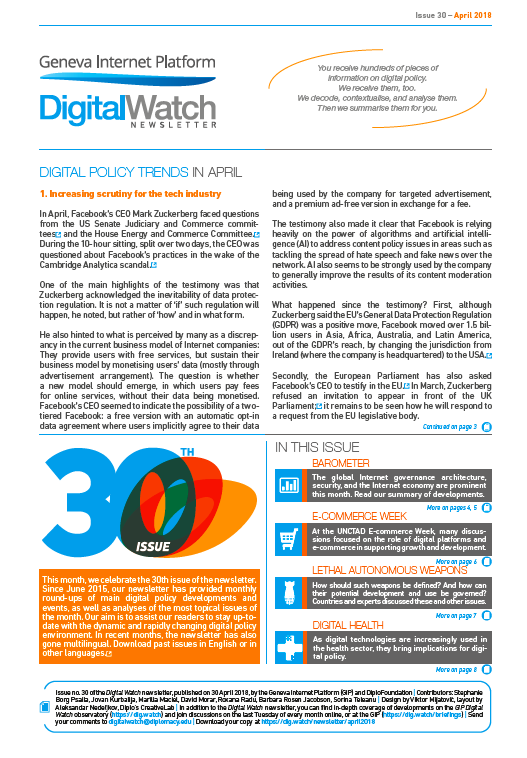
DiploNews – Issue 346 – 4 May 2018
Upcoming study opportunities
Summer online diplomacy courses
Is summer a quiet time at your office? Then it’s the perfect opportunity to take an online course. Have a look at our courses on diplomacy and Internet technology starting on 23 July:
- 21st Century Diplomacy
- Diplomatic Law: Privileges and Immunities
- Multilateral Diplomacy
- Internet Technology and Policy
Apply by 21 May for University of Malta accredited courses and by 18 June for Diplo certificate courses. For further information or to apply, click on the titles of the courses listed, or visit our courses webpage. Register now to reserve your place.
Malta scholarships
Thanks to support from the government of Malta, partial scholarships are available for applicants from developing countries to attend upcoming Diplo online courses. These scholarships cover 30%–60% of course fees and can be applied to most online courses in 2018. Browse our course catalogue and contact us at admissions@diplomacy.edu for further information. You can also sign up for our courses mailing list to be informed about upcoming courses.
Diplo and the GIP at RightsCon
DiploFoundation and the Geneva Internet Platform will be actively engaged in the 7th RightsCon Summit, to be held on 16–18 May, in Toronto, Canada. We will be hosting a booth and organise two sessions.
Diplo and the Geneva Internet Platform will be present in Toronto, hosting a booth and organising two sessions:
- Bay Area tech companies and governments: Discovering the art of conversation
- The elephant in the room: The funding dimension of capacity development
See more details. Have you donwloaded your copy of the the report “The rise of techplomacy in the Bay Area“?
April newsletter: The latest developments and trends in digital policy
 Published on 30 April, issue 30 of the Geneva Digital Watch newsletter provides the latest digital policy updates which took place in April. The main highlights include:
Published on 30 April, issue 30 of the Geneva Digital Watch newsletter provides the latest digital policy updates which took place in April. The main highlights include:
- An overview of the top digital policy trends of the month (from increasing scrutiny for the tech industry to a Cybersecurity Tech Accord);
- A round-up of the discussions held at the E-Commerce Week organised by the United Nations Conference on Trade and Development (UNCTAD), where participants explored opportunities and challenges of the evolving digital economy;
- A summary of the main issues addressed by the Group of Governmental Experts on Lethal Autonomous Weapons Systems (LAWS) at its recent meeting, such as the characterisation of autonomous weapons and possible options to address the humanitarian and security challenges posed by LAWS;
- A look at the policy implications associated with advancements in the field of digital health;
- The Internet Governance Barometer for April, which shows the Internet economy, digital rights, and legal issues being among the most prominent topics of the month; and
- A review of the main digital-policy-related events held in International Geneva.
Next WebDebate: Can we teach and learn negotiation skills online?
Negotiation skills are developed over years and years of practical experience; there are very few shortcuts to becoming a good negotiator. In our May WebDebate, we will unpack ideas about teaching and learning negotiation skills. In particular, we will look at the potential of teaching and learning negotiation skills online. Our speakers, Ambassadors Stefano Baldi and Kishan S. Rana, and Dr Katharina E. Höne, will reflect on years of negotiation practice and teaching experience. Read more about the debate and the background of our speakers. Join us on Tuesday, 8 May at 11:00 UTC. Register your place.
New briefing paper: April 2018 meeting on Lethal Autonomous Weapons Systems
In our new briefing paper, Barbara Rosen Jacobson analyses the debate of the April 2018 meeting of the Group of Governmental Experts (GGE) of the Convention on Certain Conventional Weapons (CCW) and the progress that has been made in discussing emerging technologies in the area of lethal autonomous weapons systems (LAWS). She highlights the search for a definition of LAWS, the growing consensus on the necessity of meaningful human control, the role of a pre-emptive ban, and various policy options. Read the full paper.
What’s been happening in Diplo’s blogsphere
This time, our blog focuses on the techplomacy and diplomatic representation in the San Francisco Bay Area. In Techplomacy in the US California Bay Area, Pavlina Ittelson reflects on Diplo’s recent study on the topic and highlights that innovative approaches to diplomatic practice were adopted ‘partly due to the fast-paced, unique Bay Area entrepreneurial ecosystem and partly due to the issues that states address in this setting – such as data, blockchain, urban mobility, AI, IoT, and live sciences, as well as the future impact of new technologies on the stability and prosperity of the state’. In Techplomacy: Denmark’s bridgeway to Silicon Valley, Mads Mateusz Jaszczolt Fritzboeger focuses on the Danish experience and how the appointment of the World’s first ‘tech ambassador’ to Silicon Valley fits within Denmark’s overall foreign policy strategy.

